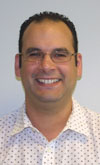|
By Katie Stacy
Public relations
Cuban native Thomas Diaz
graduates May 20 with a different upbringing from many of his S.C.
College of Pharmacy peers.
Diaz, who was raised in
the small town of Colon, Cuba, made his first trip to the United States
at 18 and has not gone back in the 11 years that he has lived here.
"I'm not planning to go back until the political system changes," he
said.
 Dr. Thomas Diaz Dr. Thomas Diaz
Diaz, who graduates with a
doctorate in pharmacy, likes the freedom of speech, freedom of
religion, the free press, free assembly and free association that
Americans are given. "Cuba is really restricted and really controlled.
Growing up in Cuba, you had to grow up really fast. When I'm here I can
appreciate everything I have. I can see everything I can do, and I can
see everything that the United States can provide to Cubans," he said.
Cuba hasn't always been so
restrictive. Diaz was taught by his grandfather what the country was
like before communism. His grandfather told him how great the country
was before all of the change. Diaz said his grandfather is one of his
personal heroes for taking that risk of talking about the government to
him as a little boy. His grandfather also taught him how to hunt and
fish.
Diaz's mother is another
hero for being strong and supportive. She said she worried about his
reluctance in following the regime. In his required year in the army,
Diaz said it was one of the most difficult years of his life. The
regime had total control and if you spoke against the government, you
were thrown in jail.
One of the first things
students were congratulated for in medical school was being supportive
of the government. Many people questioned Diaz and asked how he could
be a Cuban doctor and not support the government.
Diaz had to adapt to a new
way of life with his move to the U.S. He said a lot of research was
involved in figuring out how the American systems work, in particular
how to do taxes. Another struggle was learning English, which he found
easiest by just talking to people "Getting used to a system was tough
just because I didn't understand it in the beginning. I appreciated it,
but it was so different when you are used to being so controlled and
all of a sudden you have all of this freedom."
After leaving Cuba, Diaz
moved to Miami and went to Miami Dade College for his undergraduate
degree. In Cuba he had taken a semester of medical school and knew he
wanted to be involved in health care. After doing some research, he
decided he wanted to go to pharmacy school because of his love of
chemistry. He applied to five schools but he says after his visit at
MUSC, he knew that's where he wanted to go.
"When I came for my
interview, I got that feeling that I fit here. I liked the town, and
the people here were so great that after that it was not a tough
decision at all."
Diaz said there are many
differences in education in Cuba and in the United States. He said that
Cuban education is good because they follow a European style and the
literal translation of high school is pre-university. About 80 percent
of Diaz' graduating class went on to college. The one thing Diaz says
he missed is the siesta break, which is about a two hour period for
lunch and a nap.
One of the biggest
problems with the Cuban education system is people are unable to enter
the areas that they've trained in because of a lack of jobs in that
field. An example Diaz shared was about his mother, who graduated from
engineering school, but in the middle of her career got transferred to
hotel management. She had to do it to be able to support her family.
After graduation, he will
move to Florence for a job in Nuclear Pharmacy and work on his board
certification.
He said if he were to move back to Cuba, he would face many challenges
as a pharmacist. He recalls as a child going to the pharmacy and there
only being three or four medications available. Diaz said that there is
no job opportunity in nuclear pharmacy, and no specializations as there
are in the United States.
Diaz plans on staying in
the U. S., but he plans to keep his cultural roots. He says he does
miss his family, the Cuban food and the salsa dancing the most.
|



 Dr. Thomas Diaz
Dr. Thomas Diaz